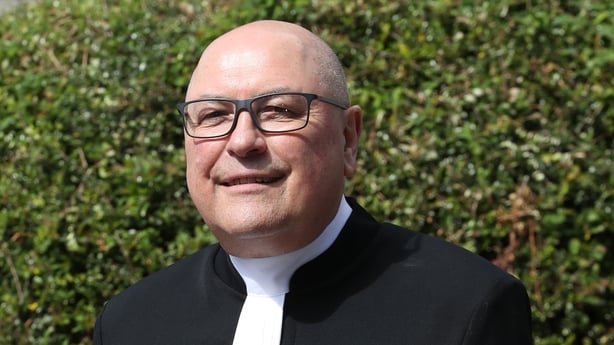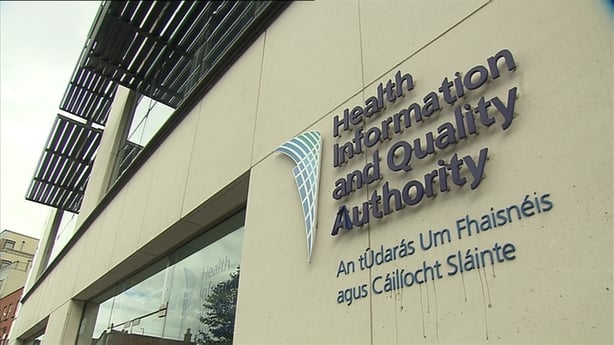Taoiseach Leo Varadkar has said a report by the Child Law Project highlighting an "unprecedented crisis" in child and family agency Tusla is a matter of deep concern.
Speaking in Brussels, Mr Varadkar said there have been Government discussions in recent months examining the issue of the growing number of children in care.
This is due to a range of factors including migration; where parents do not have a family network around them; along with a rise in the number of unaccompanied children arriving here from Ukraine and elsewhere, he said.
"The number of children that the State has to take into care for their own protection has increased substantially in recent years, and we've been struggling to match that with the skilled staff who have the skills and qualifications to look after children in State care," the Taoiseach said.
"It is something we are deeply concerned about and we are actively working on."
A former Dublin District Court judge has written to numerous Government ministers and other State agencies expressing his "utmost concern" over the welfare of some children in care, and the likelihood of future legal challenges as a result of what he described as current "systemic" shortcomings.
According to the Child Law Project, Judge Dermot Simms sent a letter in May - accompanied by six reports - to four ministers, a number of relevant State bodies, and an Oireachtas committee calling for immediate and coordinated action to remedy the current crisis.
The Child Law Project publishes regular reports from the courts regarding child protection orders and reports on the nature and outcomes of proceedings.
The latest volume comprises 67 reports and a letter from Judge Simms expressing concerns.
Two months ago, Judge Simms, who has since retired, sent the detailed letter accompanied by related documents after he had been told in court by Tusla of an "unprecedented crisis" facing it.

This has been caused primarily by a lack of properly regulated suitable placements for foster care, residential placements and special care, as well as unfilled posts in the Child and Family Agency due to a shortage of qualified personnel and staff retention issues.
Judge Simms said there was a risk or indeed a likelihood that the State would face claims in the future arising out of its failure to comply adequately with its duty of care and statutory duty to many of these children.
Child Law Project CEO Dr Maria Corbett said the letter has been published to help bring transparency to child care proceedings.
Dr Corbett said: "We share the judge's concerns and echo his call for urgent action. Our reports illustrate that the lack of appropriate placements is having a detrimental effect on the care system."
The majority of district court cases attended by Child Law Project reporters concern applications for care orders (42 cases).
Echoing previous volumes, key themes in these cases include parental mental health, parental addiction, homelessness and domestic violence.
The Child Law Project points out that the level of vulnerability of these families is apparent - in eight cases, one or both parents were in detention; in five cases, the child's parent had died; and in at least three cases the parent had themselves been in care during their own childhood. Several cases feature "strife between the parents".

In addition, it has noted that many reports involve migrants, including four that concern separated children (unaccompanied minors).
Other cases relate to children already in care, involving discussions on the appropriateness of the care placement and aftercare planning, as well as cases involving applications for costs and under the Mental Health Act 2001 and the Domestic Violence Act 2018.
In three cases, the judge granted permission for or requested that a report be prepared and sent to an external body including the Health Information and Quality Authority (HIQA) and the Ombudsman for Children.
In one, a teenage girl whose parents are both in prison had her unregistered residential care placement abruptly ended and was told she could not return from school to collect her belongings, which were placed in black bags.
Her accommodation was not HIQA approved, she had received no therapy and was described by her guardian ad litem as "essentially being warehoused".
The second case involved a nine-year-old boy from Dublin who was placed in a private residential unit in the north west; with two days' notice, he was then moved to the southeast.
In the third case, which involved two children, the judge requested that a report be prepared to determine how long there had been no social worker involved and how long overdue the statutory child-in-care review was.
The Child Law Project has also pointed out that wardship cases were heard by the High Court.
For the first time, it observed the court making an order under the newly commenced Assisted Decision-Making (Capacity) Act which will replace the adult wardship system.
Executive Director of the Child Law Project Dr Carol Coulter described the wrap-around services provided "to these vulnerable young people" as heartening, and added that "such supports can lead to children regaining their capacity and moving on to live more independently".
Today's publication has also acknowledged that many of the reports illustrate "the excellent work" undertaken by Tusla social workers, foster carers and residential care staff and the positive outcomes for children.
The Special Rapporteur on Child Protection Caoilfhionn Gallagher KC has said she shares the concerns raised by Judge Dermot Simms.
Ms Gallagher said she was grateful to the judge for highlighting the difficulties, which she added now "need to be investigated".
She also said she plans to engage with the relevant agencies and ministers who had been written to, in order to get their response and to understand what needs to be done now.
She said child protection was "not a silo issue" but one that was "cross-cutting".
'Children in care are among the most vulnerable'
The Ombudsman for Children's Office (OCO) has "specifically raised with Tusla" the use of private providers, and the need to ensure that an adequate level of care is provided to all children.
In a statement it said that the serious issues highlighted by Judge Simms in relation to the lack of regulated suitable placements for foster care, residential placements and special care, are of concern to the Ombudsman for Children.
"Children in care are among the most vulnerable and every effort must be made to ensure that they receive the supports they need. However, children cannot be adequately supported if they do not have a suitable, secure and stable place to live," it said.
In May, the OCO suggested to the Joint Oireachtas Committee on Children prohibiting the placement of children in unregulated accommodation and imposing a statutory duty for Tusla to ensure that there are sufficient appropriate placements for children within each administrative area, including for children in need of emergency accommodation.
OCO representatives who were before the committee to discuss the Child Care (Amendment) Bill 2023 - which deals with children in these placements - said alternative care placements should be close to a child's former home and school, and children should be placed with their siblings wherever possible.
The OCO also believes that Tusla should be required to have a system in place to identify and support teenagers at risk of being sexually or criminally exploited.
"We know that a certain group of teenagers are At Risk and many of these are in the care system," it said.
'No one thing' can resolve current problems - Harris
Minister for Higher Education Simon Harris said the Child Law Project report clearly shows there is "no one thing" that can resolve the current problems.
He said this is about how you pull together all of the stakeholders and all of the plans.
He welcomed a statement from Tusla on the matter.
Minister Harris said the next budget "absolutely has to be a budget about children, about child welfare and about tackling child poverty".
He said the test of budget 2024 will be a test of how much progress can be made on these issues.
He pointed out a new child poverty and well-being unit has been opened within the Department of Taoiseach.
Additional reporting: Colman O'Sullivan, Laura Whelan and Micheál Lehane






